News
EU Parliament president: extending border controls only possible with ‘balanced, comprehensive approach to migration’
Published
7 months agoon
By
Ekwutos BlogIn this interview — conducted before Germany’s decision to re-introduce border checks — EU Parliament President Roberta Metsola spoke to DW about disinformation, migration and the right-wing surge in the EU election.

Maltese conservative Roberta Metsola was reelected president of the European Parliament in July 2024, only the second person and the first woman to serve in the role for two terms
© Philipp von Ditfurth/dpa/picture alliance
DW: Right before the EU elections in June, the then European Parliament media chief Jaume Duch told me that an information war is being waged against the EU. You saw disinformation on your son’s phone. What did you feel as a mother and a politician?
Roberta Metsola: First concern, then resolve.
I was concerned. “Will this disinformation influence his choices? Had the school taught him to distinguish fact from fiction?”I thought: “If this is happening to a boy whose mother is a candidate in the elections, what influence would it have on a person who is very far away from politics?”
Then came the resolve: Fix it. Fix it with strong legislation that will enable us to act strongly, politically against those who are essentially trying to undermine the EU’s political system.
At the Campus Poland of the Future conference in Olsztyn in late August, you complained that the Member States are reluctant to implement even the best legislative answers to European problems.
Metsola: Absolutely.

Metsola says that strong legislation is needed to allow the EU to act against ‘those who are essentially trying to undermine the EU’s political system’
© Jonathan Raa/NurPhoto/picture alliance
What are the issues you are most concerned about?
Metsola: Corporate social responsibility, gender rights — we need more women in various boards — whether our laws that tackle violence against women across the EU are strong enough to protect them and, considering where I come from, migration.
You said in Olsztyn that behind every migrant story is a human being. Yet at the same time, the EU is adopting stricter migration rules — and Member States are doing the same on their own — to make the Schengen zone endure. How can a balance be found between the EU as a human rights beacon and the realpolitik of “fortress Europe?”
Metsola: It’s not an easy question. It is exactly because of our inability as the EU to find that balance that our migration policy has been failing for so long.
We have so many different national contexts — land borders, sea borders. I was speaking also from the perspective of a citizen of Malta, an island migrants are trying to reach.
I’m not a politician who would say “let’s make sure that Europe does not open its door to anyone.” I have met too many people who had no choice but to place their child on a boat, because it was safer than on land.
In the past five years we have seen the temporary reintroduction of internal border controls in many EU countries.
Metsola: The Schengen freedom of movement is sacrosanct. We fought so hard to get it. Extending internal border controls can only be done with a balanced and comprehensive approach to migration — not one that would create a silo.

Roberta Metsola comes from EU Member State Malta, an island that many migrants attempt to reach by sea
© Darrin Zammit Lupi/REUTERS
For many years we would say that the EU focuses on the countries that border it. We held summits with them, telling them we’ll invest in them on the condition that they take back their migrants. I think it will require a revolution in our international relations to develop a more coherent migration policy.
How do we find the middle road?
Metsola: I believe that the Migration Pact we adopted in March can start to work on that middle road. On the one hand, solidarity between the Member States; on the other, strong external border protection — obviously different on land and on sea, the return of those who are not eligible for protection, but not isolating our migration policy from our neighborhood and development policy.
But again, we can have the best laws on paper, but if they are not implemented, then they will never work, and citizens will feel cheated.
Don’t you feel a bit powerless as the president of the institution that actually votes on these laws? After all, it is up to national governments to implement them. Don’t you wish you had some sort of figurative baseball bat to force the leaders of the Member States to implement these laws?
Metsola: Well, I see that as a little bit of my role. I have a very good relationship with the leaders of the Member States, and I present them with the fact that we are now directly elected.
The interesting situation is that all EU prime ministers are party leaders, and during the EU election campaign, they were committing, among other things, to a better implementation of EU acquis [the legislative application all EU candidate countries need to fulfill before being considered for accession – ed.].
I will hold them to it. Whenever I go to the European Council, whenever I meet any of the leaders, either individually or with my colleagues, it is my job to do it.
In early 2024, Time magazine wrote that “Metsola wants the parliament to have the power its name implies and generate laws itself.” In the light of war, migration pressure, climate change, struggling industries and the Green Deal, do you see any chance for the European Parliament to actually carve out a bit of power for itself?
Metsola: I would say that we’ve already done it. For example, the Media Freedom Act would not have been possible without a non-legislative report from the parliament.

Roberta Metsola says the European Parliament will hold EU Commission President Ursula von der Leyen (pictured here) and her commissioners to account © Dursun Aydemir/Anadolu/picture alliance
Also, look at the power the parliament wields in terms of budgetary negotiations, for example, making sure that the money goes to Ukraine, or the framework programs for EU candidate countries, the solidarity funds, Erasmus, Horizon… Without the parliament, the amounts of EU money for these programs would never have been so visible, so effective.
Now, from a legislative perspective, where does the parliament not yet have competence? Foreign affairs.
The parliamentary hearings for commissioners-designate will begin soon. Isn’t that the first and last moment when they say and do what the EP wants, and once they’re voted in, then off they go?
Metsola: I don’t think this chamber will allow that to happen. This is the first time I’m going through this process as president of the parliament and I want all commissioners to be absolutely willing to face — and respond to — tough questions from the MEPs according to their portfolio.
We expect commitments from the Commission President and her designated commissioners, and we will hold them to account.
At the press conference with Ursula von der Leyen after the vote on her second term, you said that you saw, on the Commission’s side, the acknowledgement of a stronger parliament and the will to cooperate with it. After the last five years, are you really optimistic that the institutions will cooperate?
Metsola: If the last five years showed us anything, it is that even in areas where there once was no cooperation, there was cooperation when we had no choice. I refer specifically to the Russian invasion of Ukraine and the immediate responses that had to be taken. We saw great cooperation on the political and the legislative level.
Would I have wished for more? Absolutely. Would I have expected some commissioners to be more respectful towards the parliament? Absolutely. Will I insist that the next five years be better? Always.

Populist, far-right parties such as Alternative for Germany (AfD) polled strongly across Europe in June’s EU elections
© Jörg Carstensen/dpa/picture alliance
We now have an incumbent president of the European Commission, a number of incumbent commissioners, but also many new ones. We will hold them all to account, not only at the beginning and at the end of their terms.
We’ve seen the parliament taking other EU institutions to court when this sincere respect and cooperation wasn’t upheld. And I’m the one who signs the decisions to do it — without hesitation — because I was given the mandate to do so. I will not stop.
Two years ago you had to assist the police in an operation that uncovered the so-called “Qatargate” corruption scandal. Senior MEPs were involved. The press accused a former Latvian MEP of spying for Russia. That didn’t help the image of the parliament. Are you sure political corruption will never happen again?
Metsola: It goes without saying that I hope such things will not happen again. I understand that for many parts of the world, near and far, the European Parliament, its members and its very existence are a threat.
And as someone who has fought corruption all my life — not only in my own country but in others, too — if I have a real problem on my hands, I will not make an excuse to do nothing simply because it might happen again.
Back then, my colleagues and I immediately embarked on a quest for a series of reforms that were very difficult to pass. We looked for majorities. Some new regulations went as far as I wished them to, some didn’t.
But I am glad that the election showed that people recognized our efforts. Does that mean it will never happen again? I cannot say that. But at least we have inbuilt firewalls and alarm bells to hear the signals earlier.
The outcome of the EU elections means that for the next five years, you will be dealing with a huge representation of far-right parties. Do you think such a divided parliament will be able to pass the right legislation and then ensure its implementation in the Member States?
Metsola: I consider myself part of the constructive pro-European majority that wants to build rather than destroy. And I hope that this majority, which elected me in 2022 and reelected me in 2024, will stick together to adopt tough legislation, to hold other institutions to account, to self-reform and to be ready to adapt to challenges.
So, I look forward to a parliament where majorities are formed, rather than a divided one. Will it be harder? Yes. But I am not going to question the voters’ choice. I consider myself a president of every member of the EP, my job is to make sure decisions are made here. I am confident that we can find majorities, although the MEPs are responsible for their own actions.
This interview has been edited and condensed for length.
Edited by: Aingeal Flanagan
Author: Michal Gostkiewicz
You may like


Na our mama be this o, we no get another one Stud£nt chorus ; Na your mama be this o eh And the Nursing school managem£nt issued query just because of the stud£nts chorus and allegedly have plans to punish them for what they did.
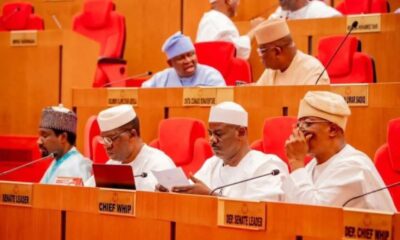

The senate has called on the federal government to take urgent action to address the rising cost of data services in the country.


Tariff uncertainties to keep gold prices in India between Rs 87-90K range in H1-2025: Report
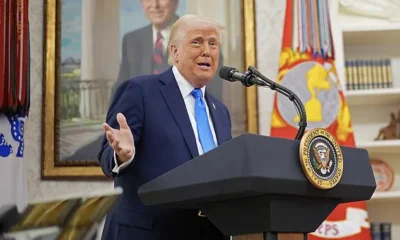

The telling sign Trump is walking back his public feud with Canada
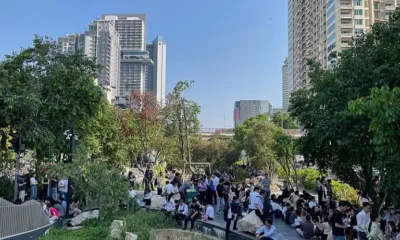

Is it safe to travel to Thailand and is Bangkok airport open? Latest advice after Myanmar earthquake
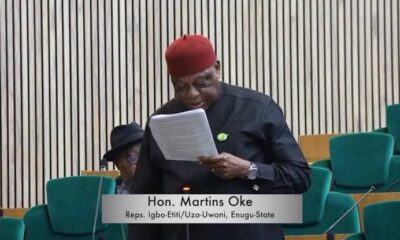

BREAKING: INEC Receives Petition to Recall Federal Lawmaker Martins Oke
Business
Tariff uncertainties to keep gold prices in India between Rs 87-90K range in H1-2025: Report
Published
23 hours agoon
March 29, 2025By
Ekwutos Blog
New Delhi [India], March 29 (ANI): US tariff uncertainties are likely to push gold prices to Rs 87,000- Rs 90,000 in the first half of the calendar year 2025 (January- June), according to a report by ICICI Bank Global Markets.
Currently, the gold prices are at around Rs 83,410 per 10 grams for 22-carat and Rs 90,990 per 10 grams for 24-carat, publicly available data showed.
The report added that the uncertainties arising due to the tariffs will ensure the investment-related demand for gold is in place.
Beginning on April 2, the Trump administration intends to implement reciprocal tariffs on trading partners as part of the “Fair and Reciprocal Plan”.
In India, the local gold prices rose by 4 per cent in the past month, reflecting the global market trend and an appreciation of 2 per cent in rupee terms against the US dollar.
“Going forward, local gold prices are expected to trade with an upside bias in the INR 87,000 per ten grams to Rs 90,000 per ten grams range in 1H2025 and moving to the Rs 94,000 per ten grams to the Rs 96,000 per ten grams range in 2H2025,” the report added.
The report anticipated that the gold prices in the global markets will be in the range of USD 3200 per ounce to USD 3400 per ounce level by December 2025.
Additionally, the US Federal Reserve‘s potential decision to lower interest rates in 2025 and 2026 could make gold more attractive, as lower US yields may support gold demand, the report added.
Central banks may also continue to diversify their reserves by holding more gold, which could keep prices steady for the long term, as per the report.
“Elevated levels of gold prices appear to be weighing on jewellery demand, which worked to pull gold imports to their lowest level in the past 11 months, at USD 2.3bn, reflecting a 14 per cent MoM decline and a 63 per cent YoY decline. Demand should pick up, responding to the festive related seasonal demand that tends to take place,” the report added.
However, gold fund flows into local ETFs still remain fairly robust, as the World Gold Council (WGC) has reported. Gold ETFs recorded inflows to the tune of Rs 19.8bn in February 2025 that were above the average net inflow of Rs 14.8bn recorded in the preceding nine months.
News
Is it safe to travel to Thailand and is Bangkok airport open? Latest advice after Myanmar earthquake
Published
1 day agoon
March 29, 2025By
Ekwutos Blog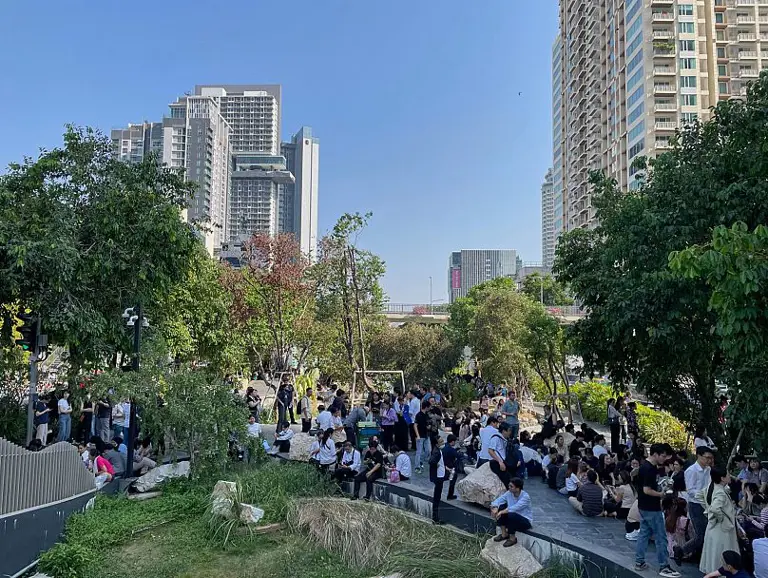
A7.7 magnitude earthquake struck Myanmar at midday local time on 28 March, sending violent tremors across Thailand and as far as China.
The jolt caused a skyscraper to crumble in the Thai capital Bangkok, causing three deaths and leaving 81 people still missing under the rubble.
European governments have updated their travel advice for tourists in Thailand and with upcoming trips. Here’s what you need to know about safety and travel insurance.
State of emergency declared in six regions in Myanmar
The earthquake, whose epicentre was near the city of Mandalay in Myanmar, has caused dozens of buildings to collapse. Its shallow depth of 10 metres amplified the ground-level impact.
A 6.4 magnitude aftershock was also felt 12 minutes later near the city, the US Geological Survey reported, with tremors being felt as far away as Laos, Bangladesh and China.
Footage reportedly filmed inside Mandalay airport shows people running through dust-filled hallways and huddled on the floor outside the building for safety.
In the town of Taungoo in Myanmar, the partial collapse of a mosque killed two people, according to Reuters.
Local media reports that at least two people have died and 20 have been injured after a hotel crumbled in Aungban in the south of the country.
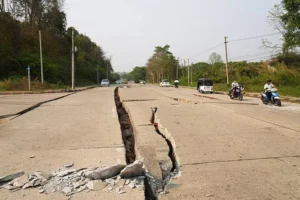
A state of emergency has been declared in six regions and states in Myanmar by authorities. Copyright 2025 The Associated Press. All rights reserved.
There are likely many more casualties across the country, but its volatile political situation under a military-run government means journalists have restricted access and reports from the ground are difficult to verify.
A state of emergency has been declared in six regions and states in Myanmar by authorities.
In Bangkok, the tower block that came down was under construction. A rescue worker said seven people had been found alive but 81 people are still missing.
Authorities have reportedly received 169 calls about damage to buildings in the Thai capital. It has been declared a ‘disaster area’.
Hundreds of residents and tourists have been evacuated to the streets from high-rise buildings and hotels, while there are reports of water sloshing out of swimming pools in several parts of the city.
Is it safe to travel to Thailand?
Thailand is a tourism hotspot which is seeing a spike in visitors after the HBO series The White Lotus was set in a resort in the country.
After the earthquake rocked the capital Bangkok, urban rail and metro systems were temporarily closed and are expected to resume services on Saturday.
Bangkok’s Suvarnabhumi airport was briefly shut down in the immediate aftermath but has now reopened, with flights operating normally. Thailand’s other major airports have not experienced disruption.
Local authorities have advised the public to avoid high-rise buildings, which crowd the densely populated city.
The UK’s Foreign, Commonwealth & Development Office (FCDO) has updated its travel advice for Thailand.
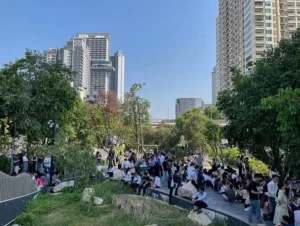
Hundreds of residents and tourists have been evacuated to the streets from high-rise buildings and hotels Associated Press
“If you’re in the area or planning to travel there, follow the advice of the local authorities or your tour operator and monitor local media,” it urges travellers.
Ireland’s Department of Foreign Affairs and Trade (DFAT) has updated its security status for Thailand to ‘high degree of caution’.
“We encourage citizens to follow the instructions of local authorities in the event of an emergency,” it has said.
There is also ongoing advice (unrelated to the earthquake) from the FCDO against all but essential travel to parts of south Thailand near the Thailand-Malaysia border.
This includes the Pattani, Yala and Narathiwat Provinces and the southern Songkhla Province south of the A43 road between Hat Yai and Sakom and south of the train line which runs between Hat Yai and Padang Besar.
FCDO also advises against all but essential travel on the Hat Yai to Padang Besar train line that runs through these provinces. This is due to regular attacks in these areas by the border with Malaysia.
Is it safe to travel to Myanmar?
The FCDO has also issued updated advice for travellers in Myanmar, stating that the epicentre is in the Sagaing region near Mandalay, but other areas may also be affected.
“Mandalay airport is reportedly closed. There may be several strong after-shocks.
“If you’re in the area or planning to travel there, follow the advice of the local authorities and monitor local media.”
Am I covered by travel insurance if I go ahead with my trip to Thailand?
The UK foreign office warns that your travel insurance could be invalidated if you travel against its advice. This means going to areas where it advises against all but essential travel.
As it has not issued a ‘no-go’ warning for earthquake-affected zones, you are not automatically entitled to a refund if you cancel your trip – referred to as ‘disinclination to travel’.
Reimbursement is only likely if your flight is cancelled by the airline or your accommodation is closed due to the earthquake.
If you have booked with a travel agent or tour operator, contact the company directly to understand your options.
“If you are travelling to Thailand over the next few days, speak to your airline or travel operator in the first instance. It may be that some regions of Thailand will be deemed unsafe to travel, in which case airlines will cancel flights, but disruption is likely to be localised so it will depend on which region you are travelling to,” says Ernesto Suarez, CEO of travel insurance providers Gigasure.
“When disruption is caused by natural disasters or circumstances outside of an airline’s control, passengers are normally allowed to change their booking, but you may not be entitled to any additional compensation.
Some insurance policies include natural disaster cover for an event that prevents travellers from reaching their holiday destination. You should read the terms and conditions carefully and talk to your provider for advice.
News
Government Pushes for Constructive Dialogue to Resolve Egbu/Uratta Layout Land Case
Published
1 day agoon
March 29, 2025By
Ekwutos Blog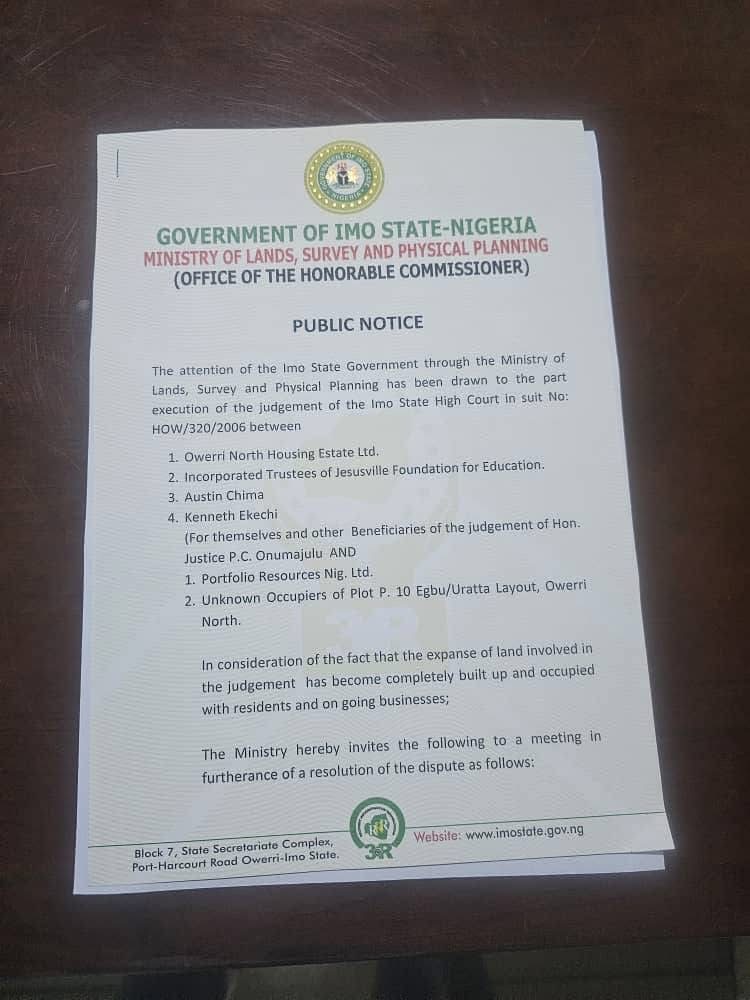
The Imo State Government, through the Ministry of Lands, Survey, and Physical Planning, has taken steps to address a long-standing land dispute by inviting the concerned parties to a resolution meeting. The public notice, issued on March 28, 2025, and signed by the Honorable Commissioner, Chief Enyinna Onuegbu, outlines the details of the initiative.
The dispute stems from the partial execution of a judgment by the Imo State High Court in suit No: HOW/320/2006. This legal case involves several parties, including Owerri North Housing Estate Ltd., the Incorporated Trustees of Jesusville Foundation for Education, Austin Chima, Kenneth Ekechi, Portfolio Resources Nig. Ltd., and the unknown occupants of Plot P. 10, Egbu/Uratta Layout in Owerri North.
According to the notice, the land in question has since been developed and is now occupied by both residents and businesses, making the resolution of this issue crucial. The Ministry has invited the following parties to a meeting aimed at finding an amicable settlement:
1. Representative of Owerri North Housing Estate Ltd.
2. Representative of the Incorporated Trustees of Jesusville Foundation for Education.
3. Mr. Austin Chima.
4. Mr. Kenneth Ekechi.
5. Representative of Portfolio Resources Nig. Ltd.
6. Representative of the unknown occupants of Plot P. 10, Egbu/Uratta Layout.
The meeting is scheduled to take place as follows:
**Date**: Wednesday, April 2, 2025
**Time**: 11:00 AM
**Venue**: Office of the Honorable Commissioner, Ministry of Lands, Survey, and Physical Planning.
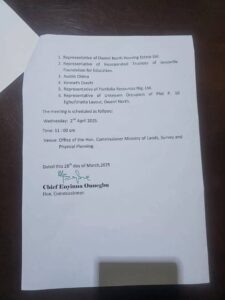
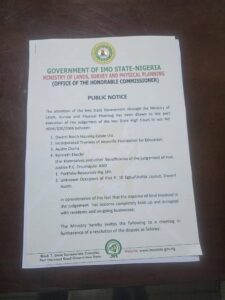
This effort demonstrates the government’s commitment to resolving disputes and ensuring harmonious coexistence within the state.
Stakeholders are urged to attend the meeting as scheduled to contribute to a fair and lasting resolution.

Na our mama be this o, we no get another one Stud£nt chorus ; Na your mama be this o eh And the Nursing school managem£nt issued query just because of the stud£nts chorus and allegedly have plans to punish them for what they did.

The senate has called on the federal government to take urgent action to address the rising cost of data services in the country.

Tariff uncertainties to keep gold prices in India between Rs 87-90K range in H1-2025: Report
Trending

 Trending5 months ago
Trending5 months agoNYA demands release of ‘abducted’ Imo chairman, preaches good governance
- Business5 months ago
US court acquits Air Peace boss, slams Mayfield $4000 fine

 Politics5 months ago
Politics5 months agoMexico’s new president causes concern just weeks before the US elections
- Entertainment5 months ago
Bobrisky transferred from Immigration to FCID, spends night behind bars
- Entertainment5 months ago
Bobrisky falls ill in police custody, rushed to hospital

 Politics5 months ago
Politics5 months agoRussia bans imports of agro-products from Kazakhstan after refusal to join BRICS

 Politics5 months ago
Politics5 months agoPutin invites 20 world leaders
- Politics1 year ago
Nigerian Senate passes Bill seeking the establishment of the South East Development Commission.

